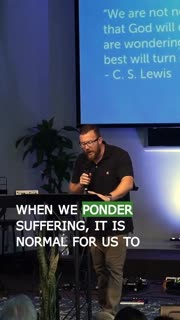Embracing Suffering: Finding Hope Before the Miracle
Devotional
Sermon Summary
Bible Study Guide
Sermon Clips
### Quotes for Outreach
1. "The whole point of the New Testament. The whole point of the gospel was so that he was accessible to everyone. And then we go back to pigeonholing the gospel into, I wish I could do it like them. That's what it was with Moses. And as if it wasn't enough in the Old Testament to see that the people who were closest to God, right? Let's talk about Moses. Let's talk about David. Those people had serious moral failures. They weren't designed to have that type of pressure." [09:12] (30 seconds)
2. "The truth of the gospel will set you free. The truth of Jesus, the truth of what his death, burial, and resurrection for the church means, it will absolutely set you free. But the false teaching around that truth will put you back in bondage. It will not set you free. You will remain in your sin. And this idea that church, is this place that I come so that everything gets better, is misrepresenting the gospel." [25:58] (28 seconds)
3. "Stop trying to avoid the very things that the Lord wants to take you through. Can I just like teleport onto the other side of this? You're missing the point of the gospel. This story is such a beautiful story. When we watch all the emotions that take place around it, Jesus, of course, is at the center of it, not Lazarus. The point is, it's just because you're friends with him, you don't avoid those things. You know how to go through those things when you're friends with him." [33:32] (30 seconds)
4. "We boast in our afflictions because we know that afflictions produce what? Endurance. Endurance produces proven character and proven character produces hope. This hope will not what? Disappoint us. Because God's love has been poured out in our hearts through the Holy Spirit who was given to us. That is the gospel, ladies and gentlemen. And that is the exact opposite of what people want today." [32:17] (28 seconds)
5. "When we ponder suffering, it is normal for us to go to the elements, watch this, of time and wish to will the clock forward to a place at which our pain will pass. We often create this type of dialogue, in our prayer lives. How long, O Lord? Will you take this from me? It is important to understand and accept that no matter how hard it may be for us, we should not define the goodness of God according to the amount of time it took to solve the problem." [46:22] (31 seconds)
### Quotes for Members
1. "What is important is for us to run our race. For us to understand where we are in Christ as it pertains to the church and for us to run that race well. Not for us to say, oh, my goodness, I'm so glad I'm not like that person. That's pharisaical. I'm so glad that I have an okay house and that my bills are paid. Right. Like, we're not really going there. I'm saying, like, what are you going to do when bad things happen in your life?" [21:23] (29 seconds)
2. "Just because you're friends with Jesus doesn't mean you are exempt from pain, suffering, and sickness. These are so vitally important, these truths. I feel like this is like the meat that the church is missing in scripture. Why? Because many people are coming to church to avoid such things. To avoid pain. To have a God. To have a higher power that has power over sickness. And this is where the emphasis on healing is great. It's phenomenal. It's a part of the story. But guess what? Guess what is also a part of the story? Death." [24:38] (42 seconds)
3. "The hard times are something to talk about. Don't be bashful about the hard time that you're going through. Now, I think there's a difference between talking about it and talking about it. And, well, anyway, we'll move on from that. I don't think that that would, yeah, that won't edify us in that way. The hard times are something to talk about. Watch this. In parentheses, I put this. In a positive way with joy. How do we do it? How do we do it?" [36:48] (30 seconds)
4. "The hard times are something to walk through. Don't quit. Don't quit. Next week, we're going to experience a miracle, but look, you may be right in the thick of it this week, right now, this moment. It may have been a hard year. Let me help you with something. Don't quit. The Lord's not going to use this. The enemy will whisper to you, oh, God's not using it. This is your fault. This is because of your sin. Guilt, fear. There's therefore now no condemnation to them which are in Christ Jesus." [42:31] (35 seconds)
5. "The Lord's timing is his own. We don't have ownership. When it comes to us, we don't have ownership. When it comes to when and how God does things. I do see in scripture that prayer affected that. The Lord used our prayers, changed his mind in certain situations. He is sovereign over those decisions, and he can make those decisions to change his mind. But we see that regardless, the Lord's timing is his own." [44:42] (30 seconds)
Ask a question about this sermon
1. "The whole point of the New Testament. The whole point of the gospel was so that he was accessible to everyone. And then we go back to pigeonholing the gospel into, I wish I could do it like them. That's what it was with Moses. And as if it wasn't enough in the Old Testament to see that the people who were closest to God, right? Let's talk about Moses. Let's talk about David. Those people had serious moral failures. They weren't designed to have that type of pressure." [09:12] (30 seconds)
2. "The truth of the gospel will set you free. The truth of Jesus, the truth of what his death, burial, and resurrection for the church means, it will absolutely set you free. But the false teaching around that truth will put you back in bondage. It will not set you free. You will remain in your sin. And this idea that church, is this place that I come so that everything gets better, is misrepresenting the gospel." [25:58] (28 seconds)
3. "Stop trying to avoid the very things that the Lord wants to take you through. Can I just like teleport onto the other side of this? You're missing the point of the gospel. This story is such a beautiful story. When we watch all the emotions that take place around it, Jesus, of course, is at the center of it, not Lazarus. The point is, it's just because you're friends with him, you don't avoid those things. You know how to go through those things when you're friends with him." [33:32] (30 seconds)
4. "We boast in our afflictions because we know that afflictions produce what? Endurance. Endurance produces proven character and proven character produces hope. This hope will not what? Disappoint us. Because God's love has been poured out in our hearts through the Holy Spirit who was given to us. That is the gospel, ladies and gentlemen. And that is the exact opposite of what people want today." [32:17] (28 seconds)
5. "When we ponder suffering, it is normal for us to go to the elements, watch this, of time and wish to will the clock forward to a place at which our pain will pass. We often create this type of dialogue, in our prayer lives. How long, O Lord? Will you take this from me? It is important to understand and accept that no matter how hard it may be for us, we should not define the goodness of God according to the amount of time it took to solve the problem." [46:22] (31 seconds)
### Quotes for Members
1. "What is important is for us to run our race. For us to understand where we are in Christ as it pertains to the church and for us to run that race well. Not for us to say, oh, my goodness, I'm so glad I'm not like that person. That's pharisaical. I'm so glad that I have an okay house and that my bills are paid. Right. Like, we're not really going there. I'm saying, like, what are you going to do when bad things happen in your life?" [21:23] (29 seconds)
2. "Just because you're friends with Jesus doesn't mean you are exempt from pain, suffering, and sickness. These are so vitally important, these truths. I feel like this is like the meat that the church is missing in scripture. Why? Because many people are coming to church to avoid such things. To avoid pain. To have a God. To have a higher power that has power over sickness. And this is where the emphasis on healing is great. It's phenomenal. It's a part of the story. But guess what? Guess what is also a part of the story? Death." [24:38] (42 seconds)
3. "The hard times are something to talk about. Don't be bashful about the hard time that you're going through. Now, I think there's a difference between talking about it and talking about it. And, well, anyway, we'll move on from that. I don't think that that would, yeah, that won't edify us in that way. The hard times are something to talk about. Watch this. In parentheses, I put this. In a positive way with joy. How do we do it? How do we do it?" [36:48] (30 seconds)
4. "The hard times are something to walk through. Don't quit. Don't quit. Next week, we're going to experience a miracle, but look, you may be right in the thick of it this week, right now, this moment. It may have been a hard year. Let me help you with something. Don't quit. The Lord's not going to use this. The enemy will whisper to you, oh, God's not using it. This is your fault. This is because of your sin. Guilt, fear. There's therefore now no condemnation to them which are in Christ Jesus." [42:31] (35 seconds)
5. "The Lord's timing is his own. We don't have ownership. When it comes to us, we don't have ownership. When it comes to when and how God does things. I do see in scripture that prayer affected that. The Lord used our prayers, changed his mind in certain situations. He is sovereign over those decisions, and he can make those decisions to change his mind. But we see that regardless, the Lord's timing is his own." [44:42] (30 seconds)










